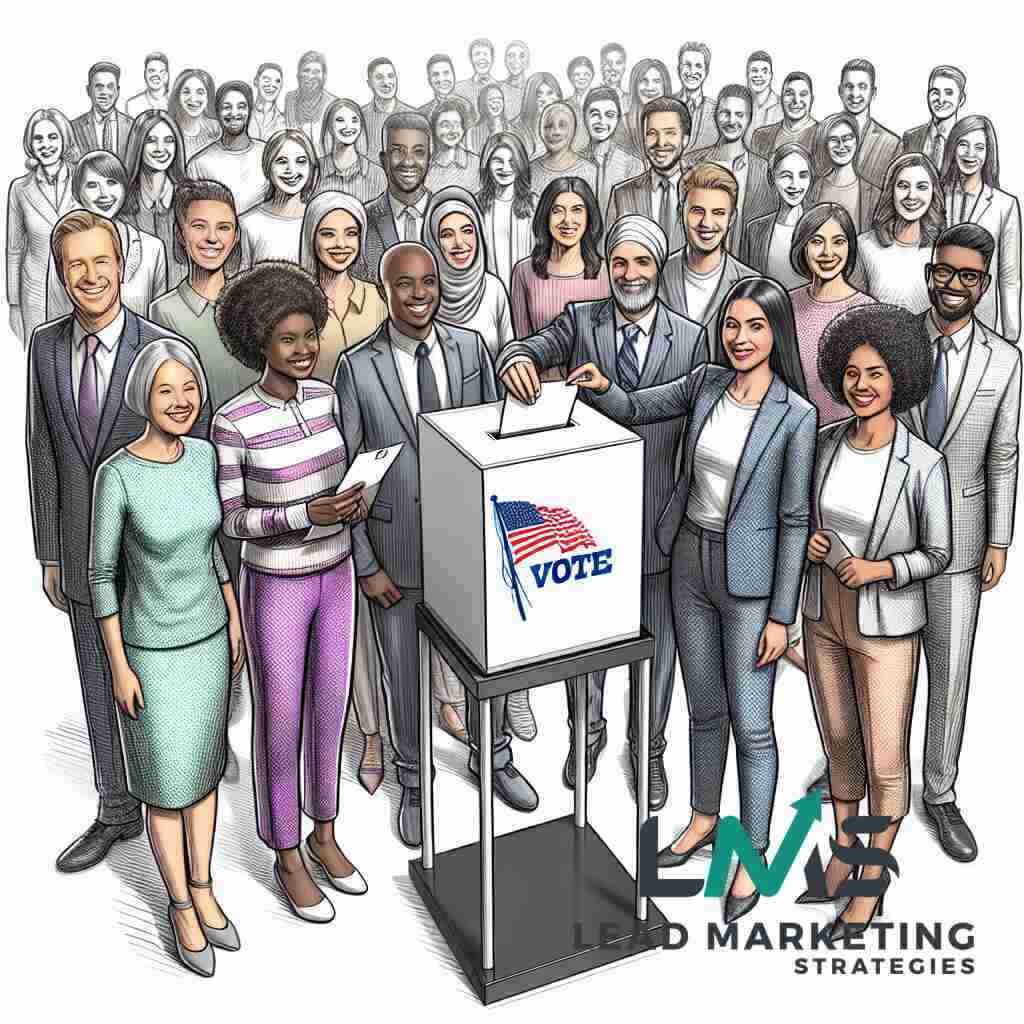Pioneering the Future of Political Campaigns with AI
The Intersection of Politics and Technology
In the modern political arena, the convergence of politics and technology is redefining campaign strategies. The rapid advancement of AI technologies is not just a trend but a revolutionary force in reshaping how political campaigns are run. By leveraging AI-powered political campaigns, candidates can enhance their reach and efficacy. This transformation allows for more personalized and effective voter engagement, ultimately leading to greater political success. AI facilitates real-time data analysis, enabling campaigns to adapt swiftly to voter sentiments and preferences, thereby crafting more resonant messages.
Harnessing AI for Electoral Success
Harnessing AI for electoral success requires a strategic approach, integrating technology into every facet of campaign management. AI is instrumental in predictive analytics for campaign planning, allowing campaign managers to make data-driven decisions. This capability is crucial for optimizing resource allocation and maximizing voter outreach. By employing machine learning for elections, candidates can analyze past voting behaviors and predict future trends. This profound insight ensures that resources are used efficiently and effectively, directly impacting election outcomes by focusing on areas with the greatest potential for impact. Ultimate Guide to Optimizing Election PPC Campaigns
The Evolution of Political Marketing Strategies
The evolution of political marketing strategies is evident as AI technologies enhance traditional approaches. Political branding with AI support provides campaigns with dynamic and adaptable branding techniques that resonate with diverse voter segments. Best Practices for Political Branding by Political Marketing Strategies. Furthermore, the use of algorithmic campaign management tools ensures that campaigns can operate beyond traditional human capabilities, analyzing vast datasets with precision and speed. Such innovations are not merely augmentations but necessary evolutions in the race to stay relevant and persuasive in an increasingly complex political landscape. How Political Marketing Strategies Redefine Impac.t With the advancements in AI, political campaigns can attain unprecedented levels of efficiency and effectiveness.
Advanced AI Mechanisms Revolutionizing Political Marketing
Predictive Analytics and Voter Targeting
In the realm of political marketing, predictive analytics serves as a linchpin for intelligent voter targeting. Campaigns can leverage big data to evaluate voter patterns and anticipate electoral trends, resulting in data-driven election strategies. By employing sophisticated models, campaigns optimize resources, honing their focus on areas of strategic importance. This approach leads to targeted voter engagement tactics, ensuring that messaging resonates with the electorate. The enhanced precision allows for resource allocation where it matters most, driving electoral success in this technologically advanced age. Moreover, predictive analytics for campaign planning refines campaign effectiveness, aligning efforts with voter needs and expectations.
Algorithmic Campaign Management: Beyond Human Capabilities
Algorithmic campaign management transcends traditional methodologies, using advanced tools to innovate political strategies. These tools handle complex data sets, automating decision-making processes far beyond human capabilities, ensuring effective election campaign management. By integrating algorithms, campaigns can continuously refine their strategies, adapting to real-time voter behavior insights. This technological evolution enables unprecedented agility, crafting agile strategies that respond to dynamic political landscapes. Such innovations ensure the sustainability of political PR services and political marketing solutions, proving indispensable in contemporary campaign management. Algorithmic campaign management tools pave the way for future-ready political strategies, setting new benchmarks in political marketing.
The Role of Machine Learning in Political Messaging
Machine learning for elections plays a transformative role in crafting personalized political messages. By dissecting historical voter interactions, machine learning identifies influential factors guiding voter behavior, enhancing the impact of political communication strategies. This precision supports adaptive political content creation, aligning messages with distinct voter segments to maximize engagement and retention. Best Approaches to Political Content Curation in 20.25 As machine learning continues to evolve, its role in political content marketing becomes increasingly central, facilitating sophisticated political messaging techniques. Moreover, machine learning empowers campaigns with cognitive computing innovations, offering deep learning election insights that revolutionize traditional campaign approaches. These advancements in AI in political messaging fortify political brand development, ushering in an era of intelligent election strategies tailored to diverse electorates.
Transforming Political Engagement and Branding through AI

Sentiment Analysis as a Tool for Campaign Feedback
As political campaigns increasingly rely on data-driven insights, sentiment analysis emerges as an invaluable tool for gathering campaign feedback. Through sophisticated NLP techniques, campaigns can evaluate public sentiment trends across various digital platforms. This allows for real-time adjustment of political messaging to ensure alignment with voter emotions and expectations. By applying these insights, political campaigns can craft more resonant messages that address voter concerns. Understanding the emotional landscape of the electorate is crucial for maintaining candidate credibility, fostering trust, and securing voter loyalty in competitive environments. By leveraging sentiment analysis for political feedback, campaigns are better equipped to navigate the complexities of voter sentiment.
AI-driven Political Branding and Identity Management
In the digital age, AI-enhanced political branding plays a pivotal role in identity management for political figures. AI tools analyze vast data streams to formulate branding strategies that resonate with targeted demographics. By refining campaign messages, AI helps candidates maintain a consistent and appealing image across all media outlets. This technique ensures that political branding remains adaptable, yet authentic, amidst ever-evolving voter preferences. Moreover, AI empowers campaigns to personalize outreach efforts, thereby strengthening the candidate’s connection with the electorate. AI’s role in this sphere is profound, as a well-crafted brand is essential in capturing voter imagination and support. Explore more about AI-enhanced political branding, offering innovative solutions for dynamic identity management.
Chatbots and Virtual Assistants in Voter Interaction
AI-driven voter interaction via chatbots revolutionizes the way political campaigns engage with the electorate. These intelligent systems provide real-time responses to voter inquiries, fostering immediate and accessible communication. By utilizing AI, campaigns can automate routine interactions, allowing for scalable engagement strategies that reach broader audiences efficiently. Chatbots are designed to simulate human-like conversations, making them ideal for answering common queries and delivering personalized campaign information. Moreover, virtual assistants are invaluable in collecting feedb andck, providing analytical insights into voter preferences and concerns. How Effective Are Today’s Political PR Services? This technology ensures that campaigns remain responsive and engaged with their voter base, enhancing reputational trust and credibility. Leverage AI-driven voter interaction via chatbots to increase voter engagement and loyalty in electoral efforts.
AI’s Impact on Communication and Community Outreach
Adaptive Content Creation and Distribution
In the dynamic world of political marketing, adaptive content creation plays a crucial role in reaching a diverse electorate. By leveraging AI, political campaigns can craft personalized messages, ensuring that communication resonates with each segment of the audience. AI algorithms analyze voter data for relevance, predicting which content themes will engage specific voter groups. This level of personalization facilitates a dynamic distribution strategy, maximizing coverage across various platforms. Campaigns that integrate AI in their adaptive content strategies see increased voter engagement and improved overall campaign performance. Such innovations are at the forefront of digital transformation in political engagement, giving campaigns the agility to respond in real-time to shifts in public sentiment and media landscapes.
Virtual Reality Engagement in Political Campaigns
Virtual reality (VR) is revolutionizing how political campaigns engage with supporters, offering immersive experiences that foster deeper connections. Campaigns use VR to simulate environments where voters can interact with political figures and policies in engaging, memorable ways. This technology provides the electorate with a firsthand experience of candidates’ visions, enhancing emotional engagement and persuasion. Furthermore, VR enables campaigns to communicate complex policies in a simplified, experiential manner that traditional media cannot match. As a strategic tool, virtual reality engagement in campaigns strengthens voter relations, positioning political entities as innovative and forward-thinking.
Smart Data Analytics for Community Outreach Strategies
Smart data analytics is pivotal in refining community outreach strategies, empowering campaigns to connect meaningfully with constituents. How to Excel in Electoral Analytics with AI Suppor.t By utilizing AI-driven data insights, political marketers can identify key community trends and issues with precision. This knowledge allows for crafting tailored messaging that addresses specific voter concerns, building trust and relevance. Smart analytics also help in segmenting the electorate geographically and demographically to target outreach efforts more effectively. This data-centric approach enhances campaign resource allocation, ensuring tactical engagements in communities where they matter most. Election outcomes are significantly impacted by such targeted strategies, as evidenced by campaigns employing election strategies using smart data analytics, thus driving meaningful voter connections and amplifying political impact.
Charting the Future: AI and Political Marketing Synergy
Predictive Insights and Electoral Success
Political campaigns are increasingly reliant on AI-driven insights to forecast future electoral success. By employing data analysis for election strategies, campaigns can dissect historical voting patterns and predict future outcomes with remarkable accuracy. This strategic foresight allows political entities to optimize their resources efficiently, ensuring targeted campaigning in regions with high electoral significance. These predictive insights not only sharpen campaign focus but also enhance voter engagement through customized messaging based on voter behavior analysis. With the implementation of data analysis for election strategies, campaigns are better prepared to navigate the complexities of modern elections, transforming potential challenges into opportunities for electoral triumph.
Blockchain Implications for Secure Voting
Blockchain technology heralds a new era of secure and transparent voting systems, promising to revolutionize the electoral process. This advanced technology ensures that electoral data is immutable and verifiable, mitigating risks associated with fraudulent activities. By leveraging blockchain technology in voting systems, political campaigns and election bodies can ensure enhanced voter trust and engagement. The decentralized nature of blockchain prevents tampering and builds an unassailable record of votes, fostering integrity and confidence in election outcomes. As election security becomes increasingly paramount, the adoption of blockchain could serve as a bulwark against cyber threats, safeguarding democracy in the digital age. For a comprehensive understanding, it is essential to explore the potential of blockchain technology in voting systems to uphold democratic processes securely.
Automation in Campaign Finance Management
AI-infused automation is transforming campaign finance management by streamlining processes and enhancing transparency. Automation enables precise tracking and reporting of campaign finances, reducing human error and increasing accountability. By automating routine tasks such as donor engagement and financial compliance checks, political campaigns can allocate resources towards strategic initiatives that drive voter engagement. Additionally, intelligent financial systems can predict budget needs and optimize expenditure, ensuring fiscal responsibility throughout the campaign. This level of automation also simplifies interactions with donors, fostering streamlined, responsive donor relations that enhance fundraising efforts. By incorporating these technologies into financial workflows, campaigns not only gain efficiency but also bolster trust with their financial stakeholders.
Photo Finish: Concluding Thoughts on AI Innovations in Political Marketing
AI as a Catalyst for Political Transformation
Artificial intelligence stands as a pivotal force, reshaping the landscape of political marketing. By enabling more precise voter targeting and efficient campaign management, AI amplifies the capabilities of political campaigns to achieve unprecedented success. Political entities are now leveraging AI-boosted political communication to craft messages that resonate deeply with voters, enhancing engagement and support. As campaigns harness the power of AI, they not only streamline processes but also redefine what is possible in the realm of political discourse. The integration of AI in political strategies signifies a new era where technology and politics converge to create impactful yet nuanced electoral journeys.
Embracing the Digital Transformation for Future Campaigns
The digital transformation driven by AI offers immense possibilities for future political campaigns. As politicians and campaign managers embrace these innovations, they are equipped to navigate the complexities of modern elections with agility and insight. AI for political grassroots mobilization revolutionizes outreach efforts, enabling campaigns to connect authentically with constituents at a grassroots level. This technological adoption fosters more adaptive strategies, ensuring that campaigns can swiftly respond to the shifting dynamics of voter preferences and social issues. By embracing digital transformation, political figures position themselves as forward-thinking leaders, capable of driving change and inspiring action.
Looking Forward: Challenges and Opportunities in AI-driven Political Marketing
While the advancements in AI present numerous opportunities, they also introduce distinct challenges that require careful navigation. The ethical implications of data usage, privacy concerns, and the potential for misinformation are significant considerations that campaigns must address to maintain voter trust. Moreover, staying abreast of the rapid technological advancements requires ongoing education and adaptation. Yet, the potential rewards for overcoming these challenges are substantial. By focusing on innovative political marketing tactics, political entities can not only enhance their strategic impact but also bolster their credibility in the eyes of the electorate. The future of political marketing is bright, with AI paving the way for more transparent, effective, and meaningful democratic processes.
Frequently Asked Questions
Question: Hodoes Political Marketing Strategies implement AI-driven political campaigns to enhance voter engagement?
Answer: Political Marketing Strategies leverages AI-driven political campaigns by utilizing advanced data analytics and machine learning to fine-tune voter targeting. This approach allows for a deeper understanding of voter behavior and preferences, enabling campaigns to craft personalized and resonant messages. Through AI-enhanced political communication, campaigns can efficiently reach and engage with diverse voter segments, ensuring that the messaging aligns with their interests and concerns. Our expertise in data-driven election strategies positions us as leaders in enhancing voter engagement and maximizing the potential for electoral success.
Question: What role does machine learning play in elections in Political Marketing Strategies’ approach to political campaign management?
Answer: At Political Marketing Strategies, machine learning is an integral part of our political campaign management framework. By analyzing historical voting data and current voter interactions, machine learning models can predict future electoral trends and optimize campaign strategies. This allows us to allocate resources where they are most needed efficiently and to craft messages that resonate with specific voter demographics. Our expertise in political content marketing and algorithmic campaign management ensures that our clients benefit from the latest technological advancements, paving the way for more targeted and effective political outreach.
Question: How does the blog title Exploring AI Innovations with Political Marketing Strategies relate to your services in digital transformation for political campaigns?
Answer: The blog title Exploring AI Innovations with Political Marketing Strategies underscores our commitment to integrating cutting-edge technology into political campaign marketing. Our services focus on digital transformation in political marketing, which includes using AI for personalized voter interactions, predictive analytics for campaign planning, and blockchain voting technology for secure elections. By adopting these pioneering AI solutions, we empower political campaigns to adapt quickly to the evolving digital landscape, ensuring effective communication and outreach strategies. As a leader in campaign digital marketing and political brand development, we provide unparalleled expertise in leveraging technology for political success.
Question: In what ways do political marketing strategies utilize AI-powered branding to develop a political candidate’s identity?
Answer: Political Marketing Strategies employs AI-powered political branding to refine and enhance a candidate’s identity in the digital space. By analyzing vast data sets, AI tools enable us to create branding strategies that resonate with targeted demographics and maintain consistency across various media platforms. Read more on political branding success. Our focus on adaptive political content creation and AI-enhanced brand development ensures that campaigns remain authentic and relevant amidst changing voter preferences. This approach allows candidates to connect more meaningfully with their electorate, enhancing trust and loyalty. Our comprehensive political marketing solutions offer innovative strategies for dynamic identity management, positioning our clients as forward-thinking leaders.
Question: How does the use of chatbots and virtual assistants in voter interaction enhance political campaign effectiveness at Political Marketing Strategies?
Answer: At Political Marketing Strategies, the use of chatbots and virtual assistants revolutionizes voter interaction by providing real-time, scalable communication with the electorate. These AI-driven tools facilitate immediate responses to voter inquiries, ensuring constant engagement and support. Chatbots are programmed to simulate human-like conversations, making them effective for addressing common questions and delivering personalized campaign messages. Moreover, virtual assistants collect valuable feedback, offering insights into voter preferences and concerns, thereby enabling campaigns to tailor their strategies. Our approach to AI-powered political branding and voter engagement strategies ensures a robust interaction framework that enhances campaign effectiveness and fosters voter loyalty.





